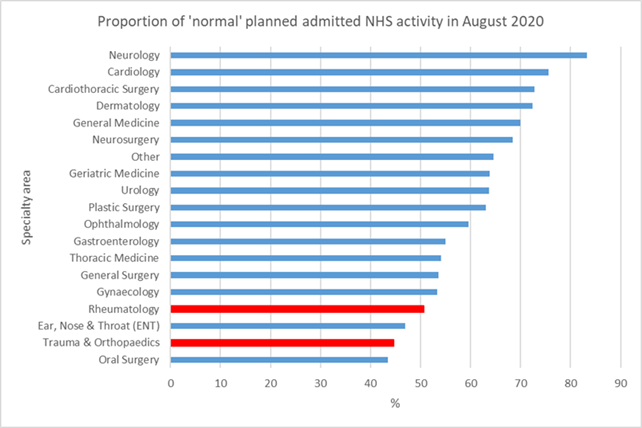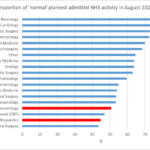 by Sue Brown, CEO ARMA
by Sue Brown, CEO ARMA
At the end of Bone and Joint Week (12 – 20 October) I reflect on how much things have changed in just ten days. It is an increasingly worrying time for both healthcare professionals and people with MSK conditions. The response to Covid-19 has already had a significant impact on the MSK health of the nation. The need for good MSK services has grown. During lockdown people worked from makeshift home offices, were less active and many were afraid to use NHS services even when they needed them.
The pause in services this spring was necessary, but it is worrying that MSK services seem to have been first to move to urgent and emergency patients only. Now that things are restarting they are returning to normal services slower. Looking at the proportion of normal elective care provided in August by speciality, orthopaedics and rheumatology both fall in the bottom four specialities. This is not acceptable. Waiting in pain impacts people’s physical and mental health and ability to work. Delays in accessing treatment such as joint replacement surgery can have long term serious impacts on health.

Now, as levels of the virus begin to rise again, we all hope that services will not need to reduce to the extent they did in spring. We all know this might be unavoidable. There was a lot of learning in spring about what helps stretched MSK services. ARMA, along with other stakeholders, has worked with NHS England & Improvement, to listen to the experience of people living with MSK conditions and identify innovations which may help us all through the coming months. These are some of the key messages:
Innovation in services
Many MSK services innovated and adapted to lockdown. The best examples of these are now being published on the NHS Change Challenge website including information about how they were done and the benefits.
Use patient organisations
Many of ARMA’s patient member organisations were deluged with queries during lockdown and despite reducing income they stepped up magnificently. They are not a replacement for NHS services; they provide vital additional support including advice, information, peer support, online groups and networks. Make sure patients know these resources exist.
Listen to patients
The MSK Lived Experience Group has collated intelligence from a range of sources to find out the impact on people living with MSK conditions and produced a report of the themes that emerged. National Voices has also produced a report: What We Need Now, What matters to people for health and care, during COVID-19 and beyond, which includes recommendations for system leaders and those designing and delivering services.
Communication, communication, communication
The thing people want most is to know what is happening. They want to know how long they might be waiting, what they can do while they wait, and they want to be reassured that they are not forgotten. If people are offered treatment, they also need to have the measures that will be taken to keep them safe explained. It’s easy to forget when you are surrounded by all the safety measures that the public are unaware of this and very frightened of contracting the virus in healthcare settings.
Self-management
People who are waiting can do things to support themselves, and there are resources that can help. This page signposts people to online resources to help them to help themselves. People are worried and stressed. It’s hard to keep going, so provide encouragement, support and links to appropriate patient organisations.
The vital importance of MSK services must be recognised. MSK health is what keeps us mobile, active and independent. It’s what helps us maintain our general health. Poor MSK health has a huge impact on the NHS and the economy. Now more than ever we need our population in the best possible MSK health.

